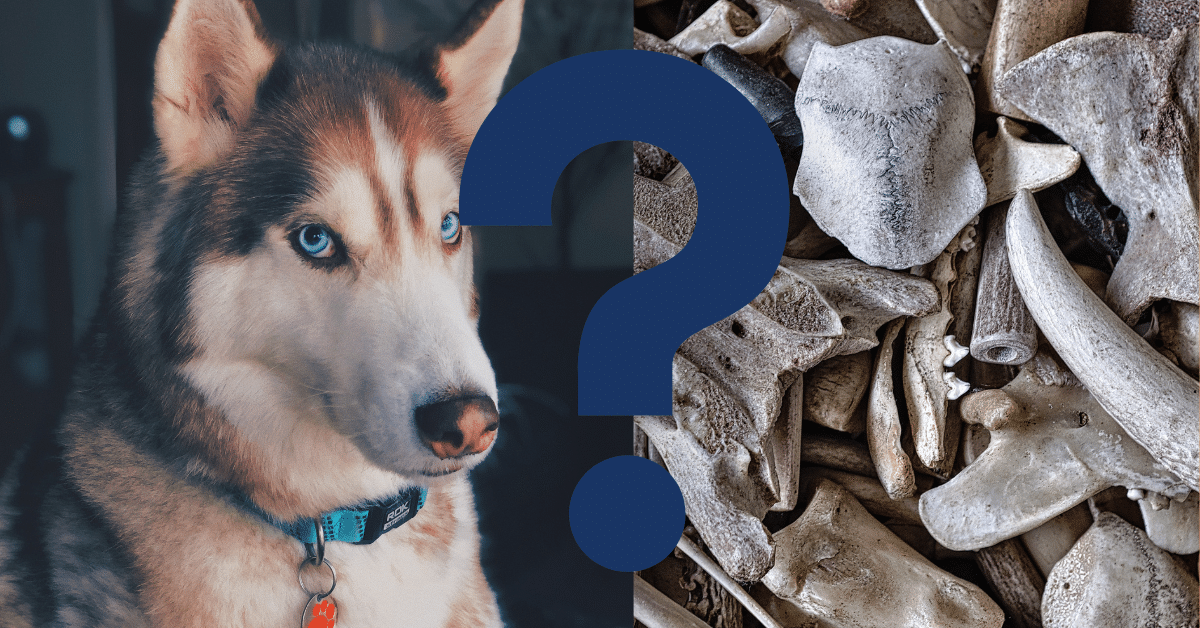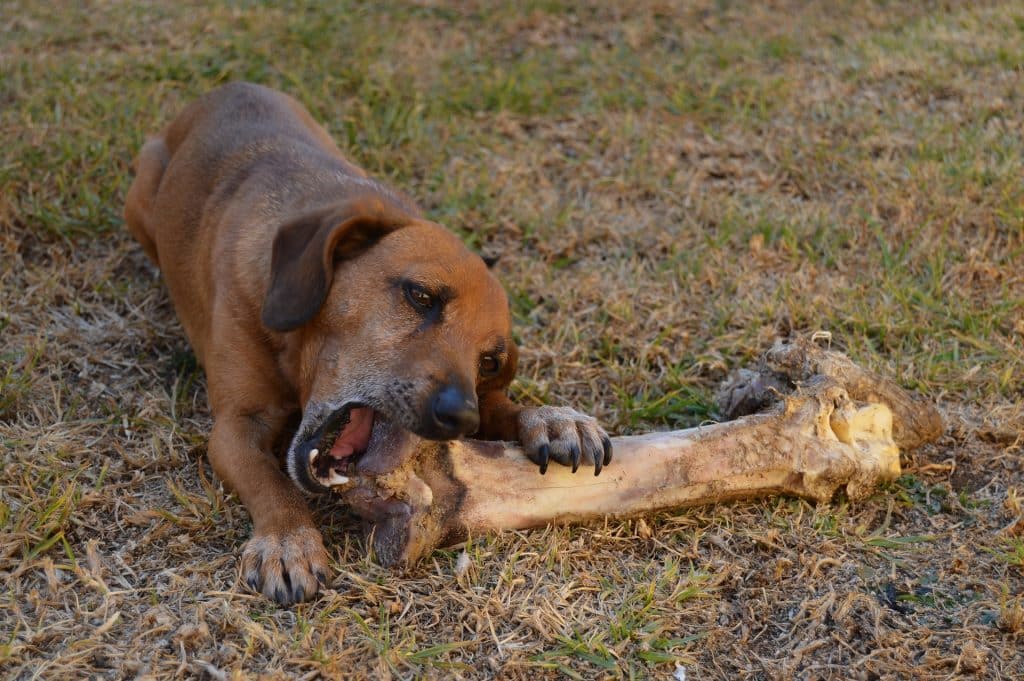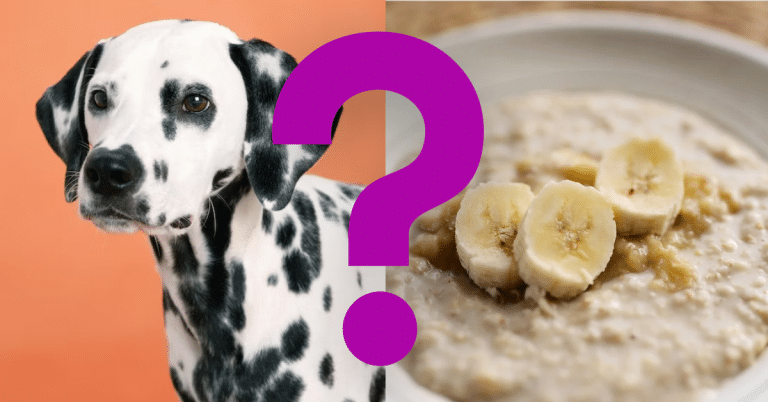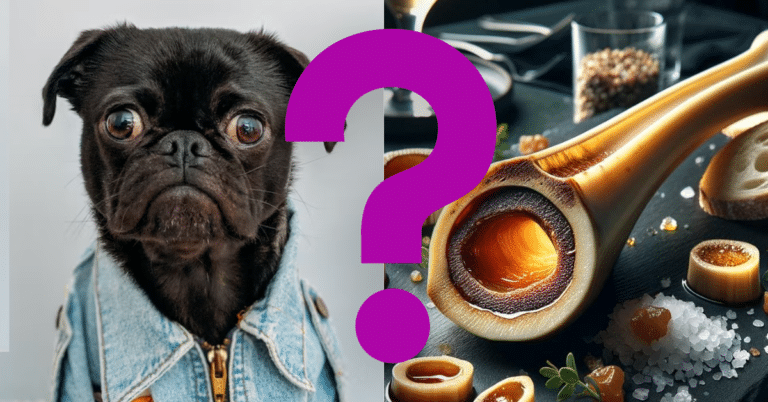Can Dogs Eat Bones? A Vet’s Opinion

Bones are stiff organs that form the skeletal system of vertebrate animals such as humans and dogs. But can you feed bones to your dog?
Dogs can eat bones, but it’s vital to be cautious. Cooked bones, particularly those that are small, brittle, or easily splinter, might constitute a choking threat or cause internal injuries in dogs. Raw bones, on the other hand, can be good for your teeth and supply essential minerals. Before integrating bones into your dog’s diet, it’s critical to purchase appropriate-sized bones for your dog’s breed and size, supervise them while they chew, and speak with a veterinarian.
Benefits Of Bones For Dogs
When provided adequately and appropriately, bones can bring various benefits to dogs:
Dental Health
Chewing on bones can help keep a dog’s teeth clean by scraping away plaque and tartar accumulation, lowering the risk of dental disorders, including gum disease and tooth rot.
Mental Stimulation
Chewing bones can give mental stimulation and assist in relieving boredom and anxiety in dogs, promoting overall mental well-being.
Nutritional Value
Raw, meaty bones from certain animals can be a rich source of vital elements, including calcium, phosphorus, and trace minerals essential for healthy bone growth, muscular function, and general nutrition.
Jaw And Neck Muscle Exercise
Gnawing on bones requires dogs to activate their jaw and neck muscles, which provides exercise and strengthening.
Stress Relieving
Chewing bones can also help dogs relax and feel more content by relieving stress, frustration, and anxiety.
Environmental Enrichment
Bones can be utilized for environmental enrichment by allowing dogs to engage in natural chewing behaviors, which can help satisfy their innate need to chew.
Bonding And Training
Sharing bones with your dog can be a bonding experience that promotes trust and positive connections. Bones can also be used as treats to reward desired behaviors during training sessions.
However, not all bones are appropriate for dogs, and there are risks involved with feeding dogs bones, mainly cooked bones or small, brittle bones that can shatter and offer a choking hazard or cause internal injuries. Before integrating bones into your dog’s diet, it’s critical to purchase appropriate-sized bones for your dog’s breed and size, supervise them while they chew, and speak with a veterinarian.

How To Safely Give Bones To Dogs
It is critical to follow the following principles while offering bones to dogs to ensure their safety:
Appropriate Bones
Choose bones that are appropriate for dogs to chew on, such as raw, meaty bones from large animals such as cattle or lamb, which are softer and less prone to shatter. Cooked bones should be avoided because they can become brittle and break, creating a choking or injury risk.
Size Matters
Select bones that are suitable for your dog’s breed and size. Bones should be big enough that your dog can’t consume them whole or readily break them up. The bone should be larger than your dog’s muzzle to prevent choking concerns.
Monitor Your Dog
Always keep an eye on your dog while they are chewing on bones to make sure they are not having any problems. If your dog is a strong chewer or has a history of digestive disorders, you should be particularly cautious and keep an eye on them at all times.
Introduce Gradually
Slowly introduce bones to your dog if they are unfamiliar with them. Start with tiny pieces and then advance to larger bones to allow their digestive system to acclimatize. Giving your dog too many bones at once might result in digestive discomforts, such as constipation or diarrhea.
Storage
When not in use, store bones carefully to prevent your dog from reaching them without supervision. Raw bones can be refrigerated for a limited time. However, cooked bones should be removed immediately after cooking.
Proper Disposal
Small, pointy, or shattered bones should be discarded since they might cause choking or injury. Bones should be disposed of securely, preventing other animals from accessing them.
Consult Your Veterinarian
Before adding bones to your dog’s diet, consult with your veterinarian, who can make suggestions based on your dog’s specific needs and health status.
It’s crucial to remember that not all dogs can tolerate bones, and some may have adverse reactions such as gastric distress or tooth damage. Always watch your dog closely and seek veterinary attention if discomfort or distress occurs.
Will Bones Make A Dog Sick?
While bones can be healthy to dogs when provided safely and acceptably, they can also create health problems if not handled properly. Here are some of the risks linked with giving dogs bones:
Choking Hazard: If a dog bites off an overly large piece of bone or swallows a bone whole, it can constitute a choking risk and potentially restrict the airway, potentially resulting in a life-threatening condition.
Dental damage: Hard bones, particularly those with sharp edges or that are very dense, can cause dental injuries such as shattered teeth, broken jaws, or cuts to the gums, lips, or tongue if dogs gnaw on them forcefully.
Digestive disturbance: After swallowing bones, some dogs may have digestive trouble, such as constipation, diarrhea, or vomiting. It is more likely that the dog overeats bone or has a delicate digestive tract.
Splintering Risk: Cooked bones, minimal, brittle, or splinter readily, can splinter. Sharp bone pieces can pierce the digestive tract, resulting in significant injuries such as perforations, blockages, or infections.
Bacterial Contamination: Bones, particularly raw bones, can be a source of bacterial contamination, including potentially hazardous germs like Salmonella or E. coli, which can cause foodborne diseases in dogs and people.
Pre-existing Health difficulties: Dogs with pre-existing health difficulties, such as gastrointestinal troubles, dental problems, or a history of choking, are more likely to experience negative consequences from swallowing bones.
Before introducing bones into your dog’s diet, it’s critical to understand the potential risks and take proper precautions, such as selecting safe bones and monitoring your dog. At the same time, they chew and talk with your veterinarian. If you have any worries about your dog’s bones or health, always check with your veterinarian for personalized guidance.
Can dogs eat bone variations?
Yes, dogs can eat many kinds of bones, but it’s crucial to choose healthy bones for dogs to eat. Here are some examples of joint bones that dogs can eat:
Raw meaty bones: Uncooked bones from large animals such as beef, lamb, or hog that still have meat attached are known as raw meaty bones. Raw meaty bones are often softer and less likely to splinter, making them suitable for dog chewing.
Edible Bones: These are dog bones explicitly produced for them from compressed rawhide, starch, or other edible components. Dogs can eat edible bones since they are easy to digest and safe to consume.
Joint bones: Larger bones, such as knucklebones or marrowbones, are frequently slow-cooked or roasted to soften. Joint bones can give dogs a delightful and long-lasting chewing experience, and the marrow can be a source of essential nutrients.
Poultry bones: Chicken or turkey bones are generally not suggested for dogs because they shatter readily, posing a choking threat or causing digestive disorders. Cooked poultry bones should be avoided since they are very fragile and deadly to dogs.

Vet’s Summary
When administered correctly, bones can be helpful to dogs. Still, certain risks include choking hazards, tooth damage, digestive disturbance, splintering hazards, bacterial contamination, and pre-existing health issues. It’s critical to choose the proper types of bones, keep an eye on your dog while chewing, and seek personalized guidance from your veterinarian.
In addition to providing safe bones for your dog, probiotic supplements should be considered for inclusion in your dog’s diet. Probiotics are beneficial microorganisms that can aid in maintaining a healthy gut and digestive system in dogs. They can help to maintain a healthy gut flora, improve digestion, increase nutrition absorption, and boost immunological function. Probiotic supplements for dogs are available as powders, chews, and capsules and can be taken as directed by your veterinarian. However, before giving your dog any new supplement, including probiotics, always consult your veterinarian to ensure it is safe and appropriate for your dog’s specific health needs.
Videos To Watch
If you are wondering if you can give bones to your dog, watch this:
And if you want to know what a dog can NOT eat, watch this:






